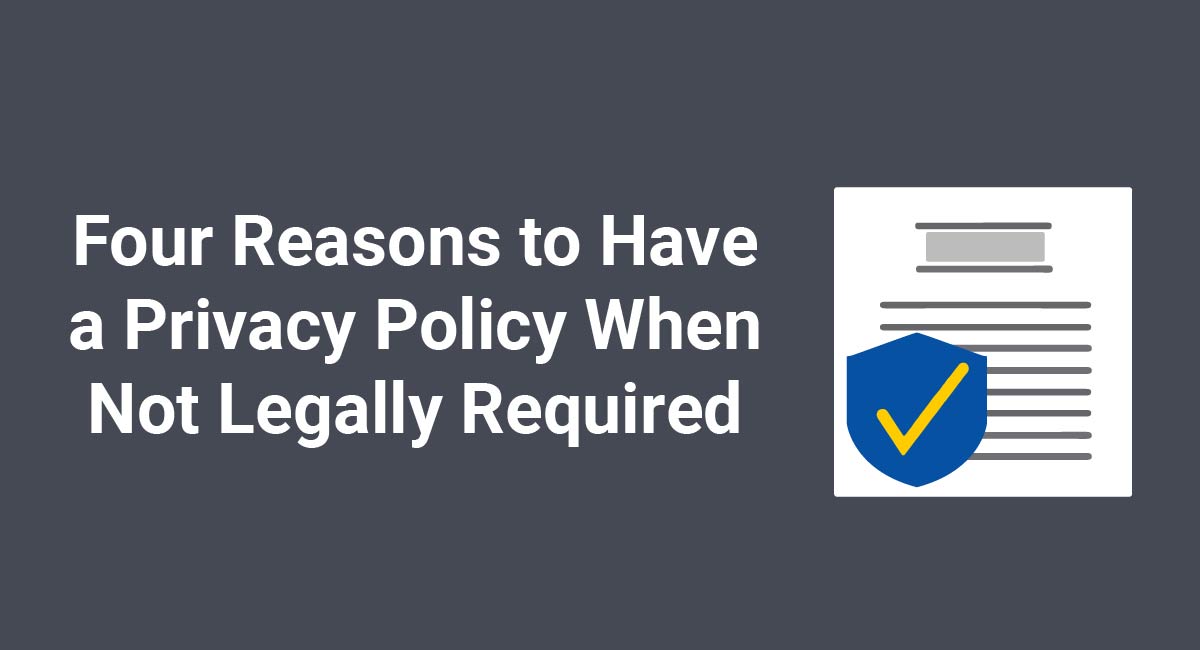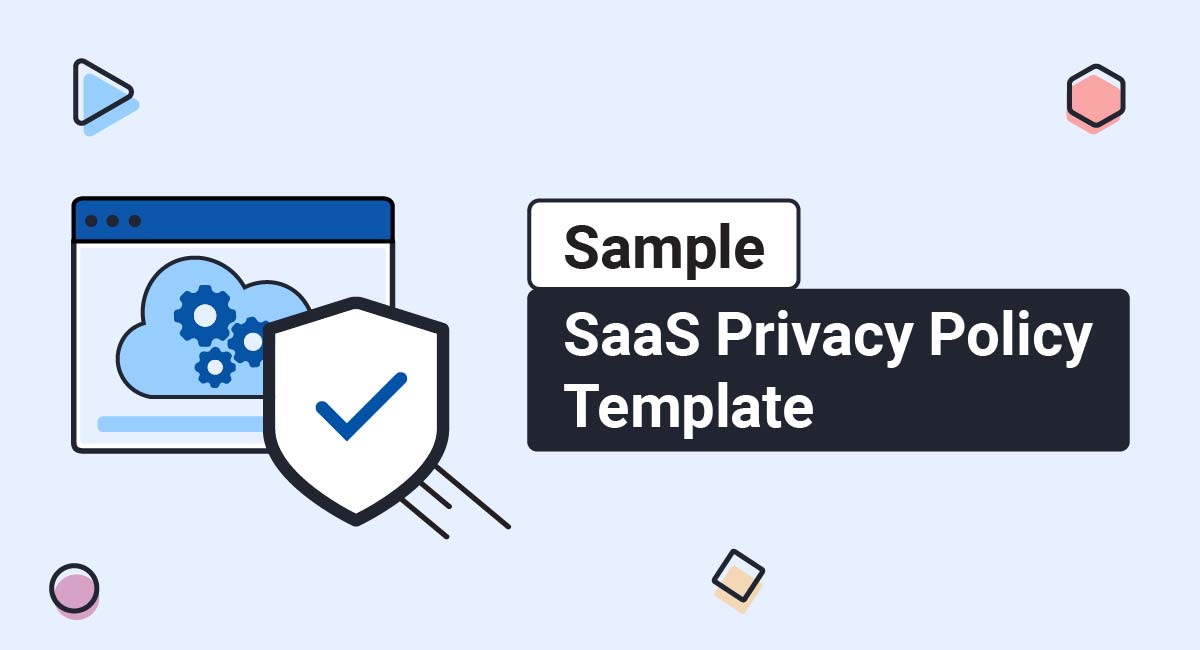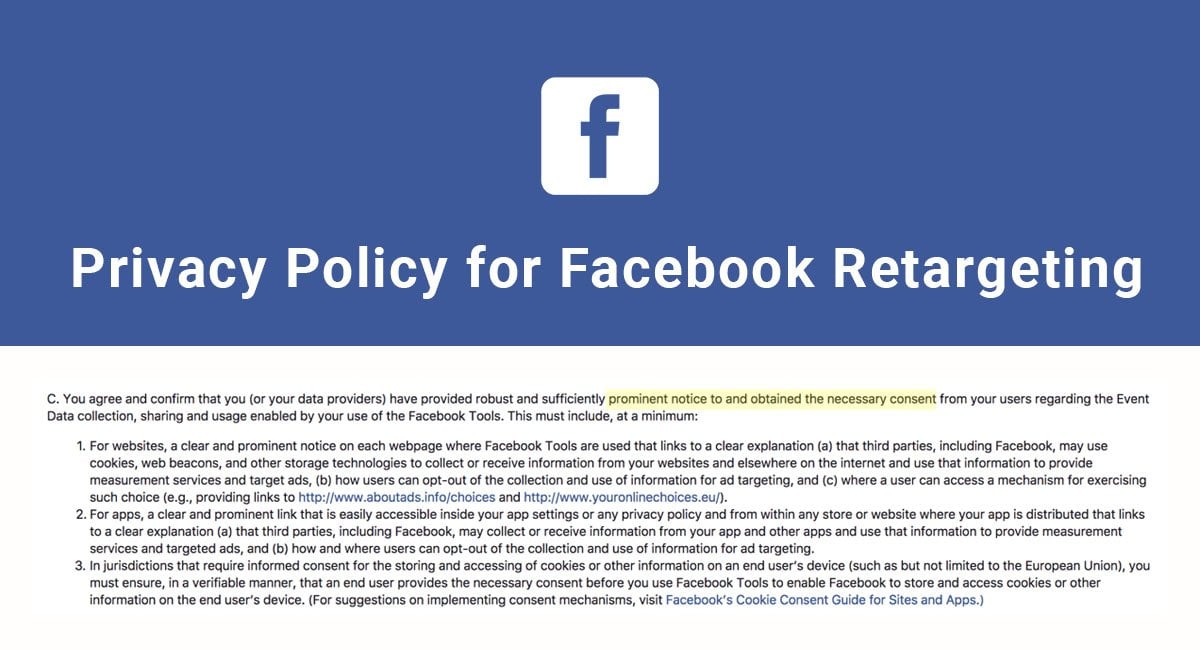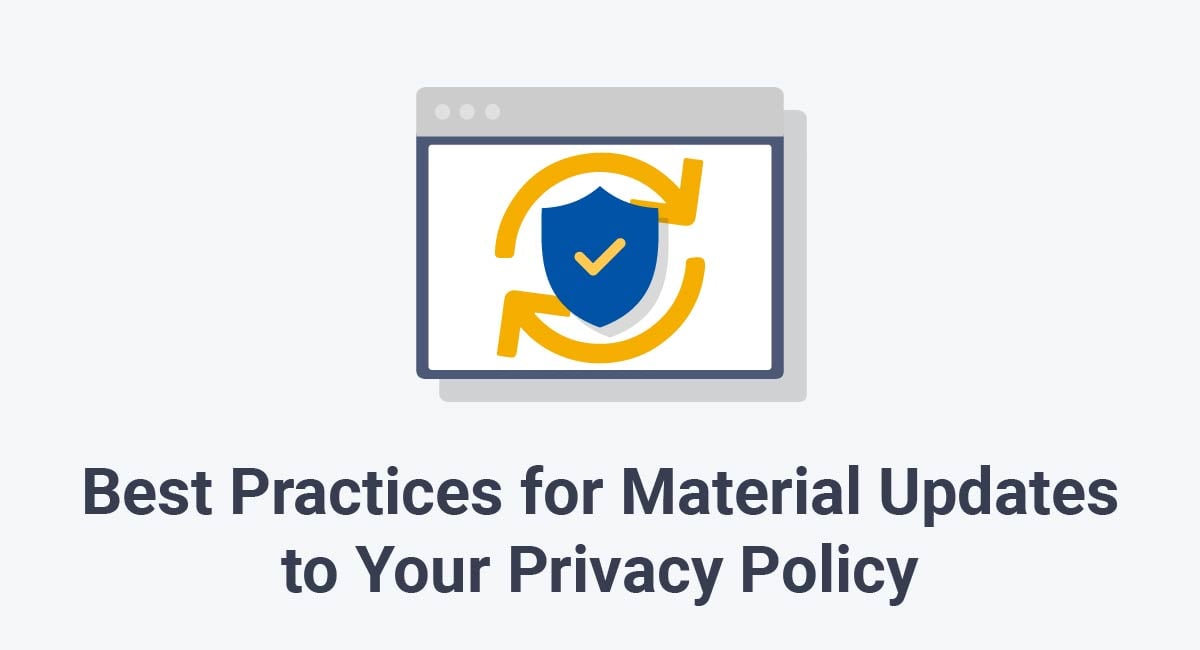As international privacy laws become increasingly more complicated and formidable, some businesses and mobile applications are choosing to build data-free environments - websites and applications that do not collect personal information from visitors and users.
By offering simple, data-free environments, online businesses can avoid any potential legal privacy disputes, as well as reduce costs by avoiding the rigorous consent and security measures necessary for collecting personal data from consumers.
However, if you were thinking that building a data-free website means you should avoid posting a Privacy Policy altogether, think again. Even when it's not legally required, a Privacy Policy is always recommended for any online business. Here are four reasons why.
Our Privacy Policy Generator makes it easy to create a Privacy Policy for your business. Just follow these steps:
-
At Step 1, select the Website option or App option or both.

-
Answer some questions about your website or app.

-
Answer some questions about your business.

-
Enter the email address where you'd like the Privacy Policy delivered and click "Generate."

You'll be able to instantly access and download your new Privacy Policy.
Reason 1: Consumer Trust

Especially in recent years, data protection and consumer privacy has come into the limelight. Customers are more aware than ever of the importance of internet privacy and data protection, as well as the consequences of negligence or infringement of consumer privacy rights.
Plain and simple, people expect to see a prominent and public Privacy Policy on every website. If they don't see one, they may wonder why it's not there and assume that your company is not up-to-date or compliant with current privacy practices.
In a 2014 survey of 2,000 US-based consumers, researchers at Deloitte & Touche LLP found that the vast majority of internet users prefer to use companies that display good privacy and data protection practices.
Another study published in the Industrial Management & Data Systems Journal shows that consumers are more likely to trust and show loyalty towards businesses that they perceive as having adequate privacy and security measures.
It's clear that customers are heavily influenced by a business's dedication to privacy and data security. One way to instantly display your company's commitment to consumer privacy is to post a public and easily accessible Privacy Policy. Even if it's not legally required, it can be an easy way to exhibit transparency and build trust with the users that visit your website.
The zero-data search engine DuckDuckGo provides a great example of this:
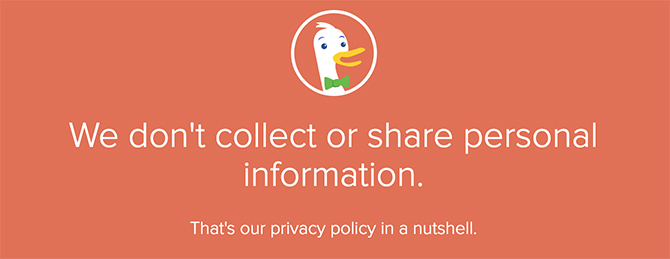
Since the company doesn't collect personal data, the DuckDuckGo Privacy Policy simply explains why a zero-data environment is a good thing and why people should care about their privacy.
While most companies will have a clause describing what information is collected, DuckDuckGo also has a clause describing what information is not collected and why this matters to users:
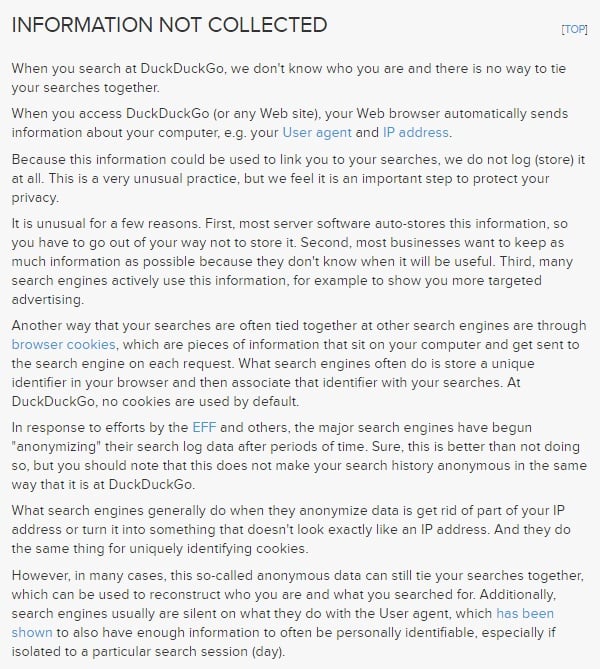
If you don't collect personal information, consider including a clause in your Privacy Policy that works to inform your users like DuckDuckGo has done.
Reason 2: Platform Recommendations/Requirements

Whether you use WordPress, Wix, or another type of platform to host your website, all of these tools strongly recommend a Privacy Policy. Wix, for example, includes the following recommendation on its website:

In some circumstances, platforms like Wix and Squarespace absolutely require a Privacy Policy on user websites. Since creating a preliminary Privacy Policy is neither difficult nor time-consuming, it is ideal to create one from the get-go if only to meet platform requirements.
Reason 3: Because Things Change

Just as your company may one day choose to create a mobile app, other things can and will change in the future. Even something as insignificant as a new plugin on your online platform could change the way your website collects user data. For example, implementation of any of the following features would create the legal need for a Privacy Policy:
- Contact forms
- SEO analytics
- Targeted advertising
- Social media sharing capabilities
- Shopping cart functionality
- User login functionality
- Email newsletter distribution
Listed above are only a few of the most common website addons or services that could change the way your business handles consumer data, but there are many more such services available that can prove useful to even the simplest of websites.
As your business grows and changes, it may become necessary or desirable to add one of these functionalities or or capabilities to your own site. If you already have a Privacy Policy available on the website, adding in clauses to support your changing website will be quick and painless.
Reason 4: Potential Legal Hassles

A website like yours may not legally need a Privacy Policy, but that doesn't mean you will avoid legal hassles if you choose not to post one. It would only take one online consumer to report your lack of a Privacy Policy to instigate an investigation.
Especially in the EU, privacy laws are stringent and thorough. Consumers can easily report a website that they believe to be in infringement of privacy regulations to legal authorities. If any legal authority, EU-based or otherwise, believes that your business is in violation of online privacy regulations, you will given the unpleasant task of proving that your website does not collect personal information.
If a legal investigation like this were to ensue, you would be required to go through the entire legal process, including piles of paperwork and possibly even hiring a lawyer, just to prove that your website does not need a Privacy Policy.
Since the internet is a global marketplace populated by all types of people, this scenario is common, even likely. It would only require a simple privacy notice stating that your business does not collect personal information to avoid potential legal hassles like these.
Creating a Simple Privacy Policy for a Zero-Data Website
If your online business does not collect user data, the Privacy Policy can be a short and simple document. In some cases, you may just need a statement describing your commitment to privacy and your assurance that your company does not collect personal data.
Here are some examples:
Phonic Flash Cards is an online game targeted to children. To avoid the legal rigmarole of collecting personal data from children, it operates a zero-data environment and posts the following Privacy Policy:
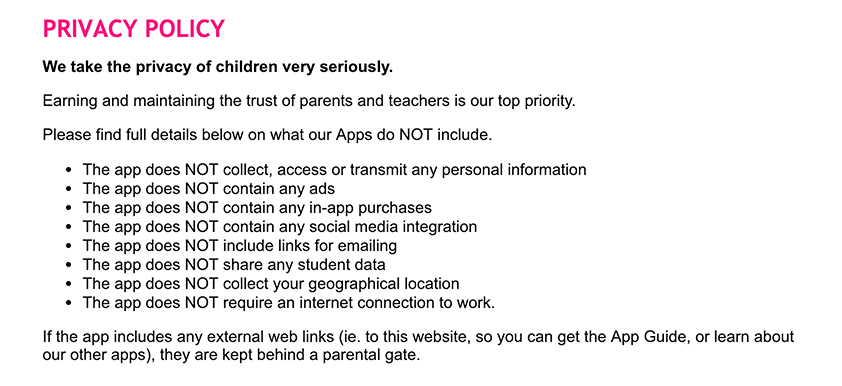
Another child-friendly gaming developer, Duck Duck Moose, makes a similar statement in its Privacy Policy. It does collect minimal information about app usage and parental email addresses, so the short policy includes both:
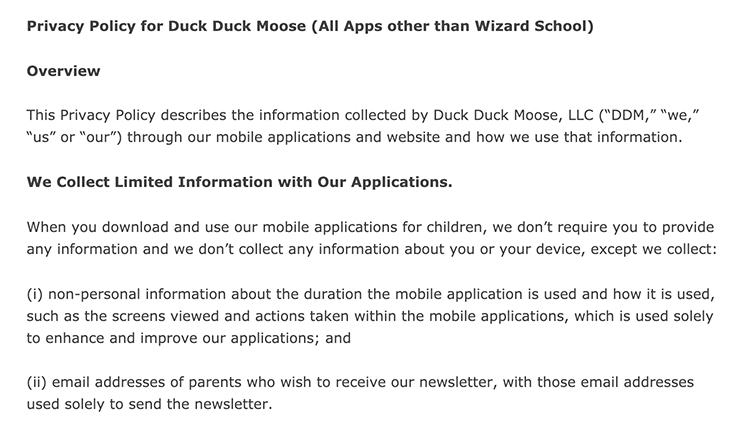
Kymatica lets users know that it doesn't collect or transmit any personal data, and because of this, it also doesn't share any:
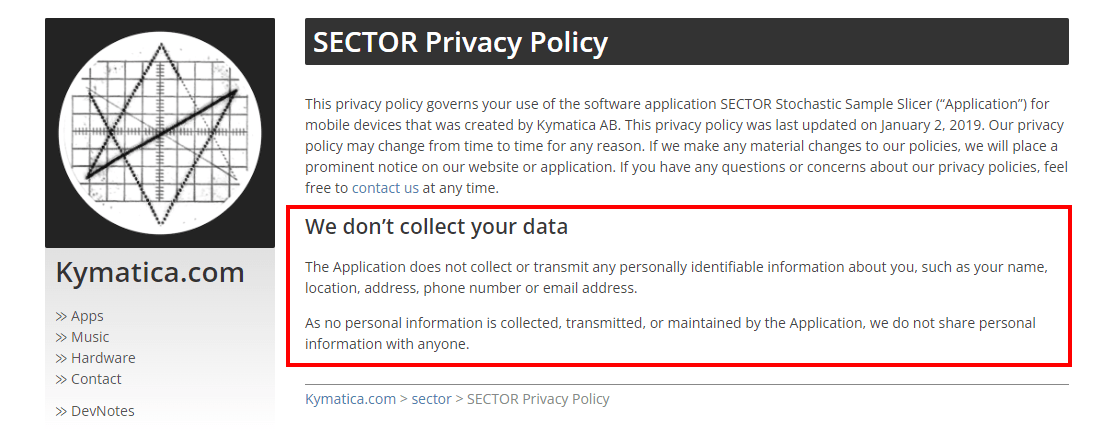
Once you have written a Privacy Policy that specifies which information you do or do not collect, ensure that it is easily accessible. Links to the Privacy Policy should be placed in the website footer or a navigation bar that appears on every page of the website, as demonstrated by DuckDuckGo here:

By following the examples set forth in this article, your business can establish an open, trusting relationship with every visitor to your website. When the time comes to change or expand your services, your basic Privacy Policy will already be in place for you to make the necessary updates and changes.

Comprehensive compliance starts with a Privacy Policy.
Comply with the law with our agreements, policies, and consent banners. Everything is included.
